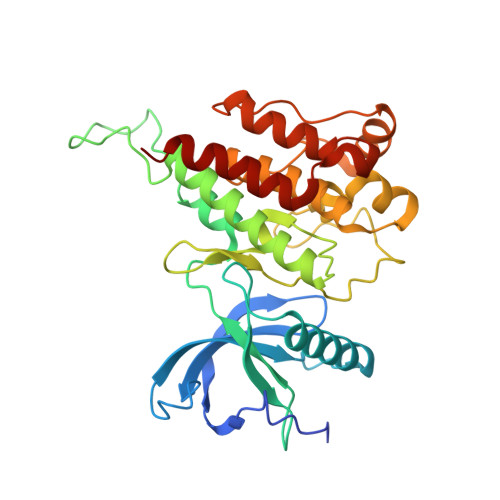Design, Synthesis, and Biological Evaluation of 5-Formyl-pyrrolo[3,2- b ]pyridine-3-carboxamides as New Selective, Potent, and Reversible-Covalent FGFR4 Inhibitors.
Yang, F., Chen, X., Song, X., Ortega, R., Lin, X., Deng, W., Guo, J., Tu, Z., Patterson, A.V., Smaill, J.B., Chen, Y., Lu, X.(2022) J Med Chem 65: 14809-14831
- PubMed: 36278929
- DOI: https://doi.org/10.1021/acs.jmedchem.2c01319
- Primary Citation of Related Structures:
7YBO, 7YBP, 7YBX, 7YC1, 7YC3 - PubMed Abstract:
The FGF19-FGFR4 signaling pathway has been extensively studied as a promising target for the treatment of hepatocellular carcinoma (HCC). Several FGFR4-selective inhibitors have been developed, but none of them receives approval. Additionally, acquired resistance caused by FGFR4 gatekeeper mutations is emerging as a serious limitation for these targeted therapies. Herein, we report a novel series of 5-formyl-pyrrolo[3,2- b ]pyridine derivatives as new reversible-covalent inhibitors targeting wild-type and gatekeeper mutant variants of FGFR4 kinase. The representative compound 10z exhibited single-digit nanomolar activity against wild-type FGFR4 and the FGFR4 V550L/M mutant variants in biochemical and Ba/F3 cellular assays, while sparing FGFR1/2/3. Furthermore, 10z showed significant antiproliferative activity against Hep3B, JHH-7, and HuH-7 HCC cells with IC 50 values of 37, 32, and 94 nM, respectively. MALDI-TOF-MS and X-ray protein crystallography studies were consistent with 10z acting as a reversible-covalent inhibitor of FGFR4, serving as a promising lead compound for further anticancer drug development.
- International Cooperative Laboratory of Traditional Chinese Medicine Modernization and Innovative Drug Discovery of Chinese Ministry of Education (MOE), School of Pharmacy, Jinan University, #855 Xingye Avenue, Guangzhou 510632, China.
Organizational Affiliation:


















